ĻŻĹī ”∆Ķ students come from across Canada and around the globe, stories and life experiences in tow ‚ÄĒ small legacies set to grow.
On campus, they encounter new ways of looking at the world, learning how to link new knowledge and understanding with a drive towards action. They form bonds with their peers, and realize the power that comes from working across boundaries and against barriers. And many finish their degree not just inspired to leave their mark on the world ‚ÄĒ¬†they‚Äôve already gotten started.
∂Ŕ≤ĻĪŰ≥ůī«≥‹≤űĺĪĪū‚Äôs Governors‚Äô Awards, the university‚Äôs top honour in student life, celebrates students who take this experience to the next level. They recognize exceptional contributions or leadership in the extracurricular realm ‚ÄĒ¬†areas like university governance, building community on campus, service in the broader community, internationalizing the campus, the visual or performing arts, minority access, athletics and more.
Nominations for the awards come from across the Dal community, with the recipients chosen by a committee consisting of ĻŻĹī ”∆Ķ's president, three Board of Governors members and the vice-provost student affairs. The awards were presented at Thursday night‚Äôs student IMPACT awards.
Meet the five exceptional students selected to receive this year’s Governors’ Awards.
Sarah Dobson (Political Science)
Setting a path towards public service
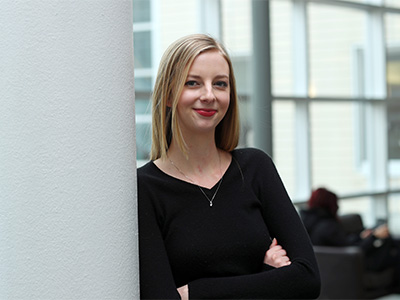 Sarah Dobson says she was always one of those kids in grade school who wanted to be a class rep ‚ÄĒ that is, until she lost an election in grade eight. Embarrassed, she shunned student politics for a couple of years before eventually getting involved again in high school.
Sarah Dobson says she was always one of those kids in grade school who wanted to be a class rep ‚ÄĒ that is, until she lost an election in grade eight. Embarrassed, she shunned student politics for a couple of years before eventually getting involved again in high school.
‚ÄúI‚Äôve outgrown that mindset now,‚ÄĚ says the fourth-year honours Political Science student from Halifax. ‚ÄúWhen I lose things now, it‚Äôs not embarrassing anymore. I say, ‚ÄėWell, I tried‚Äô and ‚ÄėI‚Äôm glad that I tried.‚Äô‚ÄĚ
It was a helpful life lesson for Sarah, who plans to go to law school at Dal this fall and hopes to one day run for elected office ‚ÄĒ an undertaking where the stakes are considerably higher.
As a student senator on the ĻŻĹī ”∆Ķ Senate and as a page in the Nova Scotia legislature for two years, Sarah gained appreciation for some of the day-to-day tasks that go into governance and policy-making. But as many of Sarah‚Äôs extracurricular and volunteer commitments show, her desire to get involved in politics stems from a deeper urge to enact change in the world.
‚ÄúYou can‚Äôt go through learning about politics and about all these things that are wrong and how we run things and the gaps that certain systems leave and not want to get in there and a least try and help fill those gaps,‚ÄĚ says Sarah, whose Political Science studies focused on international relations.
Improving refugee access to education and fostering immigrant success have been at the heart of some of Sarah’s efforts, including a placement with the Halifax Refugee Clinic and as literacy tutor for immigrant children with Frontier College. She has also worked as a student refugee program coordinator for the World University Service Canada (WUSC) at Dal, helping foreign students coming from difficult situations navigate the path to getting a degree. She served on the WUSC committee that helped raise funds to bring two additional students, both from Syria, to campus this year.
During the 2015 Canadian federal election campaign, Sarah turned her education advocacy efforts to another demographic when she started her own grassroots educational workshop called Let‚Äôs Talk Politics. She visited about 20 junior high classrooms that fall to teach kids about Canada‚Äôs electoral system and how campaigns work ‚ÄĒ topics she says she wasn‚Äôt taught much about during her own schooling.
More recently, she travelled to Ottawa to represent the riding of Halifax West at Daughters of the Vote, a national program that encourages young women across the country to enter politics and government. Participants heard from women currently serving in the House of Commons as well as Prime Minister Justin Trudeau, who Sarah got to introduce in the House one day as part of the event. As exciting and nerve-racking as that was, she says the highlight of the conference was leaving with a newfound determination to keep pushing for equality for women in politics.   
‚ÄúHearing from those women who are actually there, who have done, it was significant,‚ÄĚ she says. ‚ÄúIf I wasn‚Äôt considering ever running for politics in my future, now I am.‚ÄĚ (Matt Reeder)
Nicole Doria (Health Promotion, master's)
A passionate advocate for research and community impact
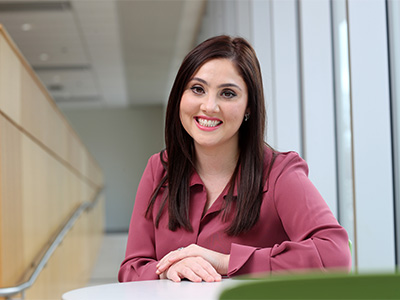 Growing up, Nicole Doria was dedicated to dancing, competing in everything from tap and jazz to lyrical and ballet. While she left the world of competitive dance behind after high school, she found it calling her back a few years later ‚ÄĒ only, this time, with a notepad in her hand rather than dance shoes on her feet.
Growing up, Nicole Doria was dedicated to dancing, competing in everything from tap and jazz to lyrical and ballet. While she left the world of competitive dance behind after high school, she found it calling her back a few years later ‚ÄĒ only, this time, with a notepad in her hand rather than dance shoes on her feet.
Nicole had seen up close just how much pressure dance could put on young women. So as an undergrad in Health Promotion at Dal, she decided to explore an issue far too common in the sport: eating disorders.
‚ÄúIt was a vulnerable environment to grow up in as a young female," says Nicole, who now as a master‚Äôs student at Dal has continued her research into the subject. ‚ÄúI feel like if there was some type of education or resources or tools for dancers or parents or coaches, it could make a big difference in young girls being able to advocate and control and improve their health and body image.‚ÄĚ
Nicole’s passion for health promotion began when she was volunteering at Sick Kids in Toronto the year after she’d completed her first undergraduate degree (in Political Science) at the University of Guelph. Looking for something to be inspired by, she found it in the connections she made with patients at the hospital.
Nicole, originally from Pickering, Ont., continues to thrive on such connections today in her fifth year as part of the Dal and Halifax communities. She spent two years working at Ronald McDonald House, supporting sick children and their families visiting hospitals in Halifax. She’s also volunteered with many community organizations including the Avalon Sexual Assault Centre, Abilities in Motion (a Halifax-based program that assists people with mobility concerns in being active) and Phoenix Youth (at-risk and homeless youth), among others.
It’s challenging work that brings her face-to-face with vulnerable populations on a daily basis.
‚ÄúPeople put their trust in you and have a conversation with you,‚ÄĚ she says. ‚ÄúI feel like just developing those relationships with people and providing resources that wouldn‚Äôt be able to be provided without volunteers is important. It may feel like little small things, but I do feel like it makes a big difference.‚ÄĚ
Nicole has been involved in a number of research groups during her time at Dal, including the Healthy Populations Institute and the Indigenous Health Interest Group. She now serves as co-president of the latter, an interdisciplinary collective that aims to reduce Indigenous health inequities and improve Indigenous curriculum development and education, in part through engaging those populations in the research. She’ll be putting that approach to work soon outside of Dal when she starts a new job at the Maritime SPOR (Strategy for Patient-Oriented Research) Support Network.
‚ÄúWhat I think is important is involving patients in the research,‚ÄĚ she says. ‚ÄúMaking sure that the research that‚Äôs done has an impact on the patients and the people who the research is intended to impact.‚ÄĚ (Matt Reeder)
Bai Bintou Kaira (Engineering)
Switching gears and inspiring others along the way
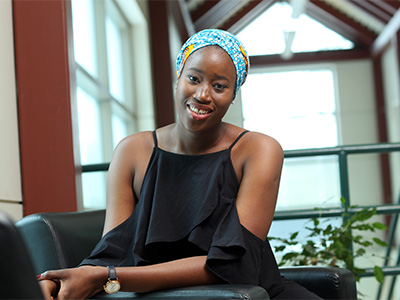 For her final co-op term this year, Chemical Engineering student Bai Bintou B. Kaira decided to pack up and head to a small mining town in the southeastern part of Saskatchewan to work for a potash company.
For her final co-op term this year, Chemical Engineering student Bai Bintou B. Kaira decided to pack up and head to a small mining town in the southeastern part of Saskatchewan to work for a potash company.
It's a long way from Halifax and even farther from her hometown of Fajara in the The Gambia in western Africa.
"I get asked a lot, 'Where are you from?' I say, 'I go to school at Dal, on the east coast, but I'm from Gambia.' They have no idea where that is," says Bintou, now in the third month of the eight-month placement.
While many students navigate new places, experiences and challenges at university, Bintou seems to actively seek them out more than some ‚ÄĒ a trait she traces back to her mother's influence.
"My mom would always encourage us to be different and say, ‚ÄėDon‚Äôt be overshadowed by the world of culture, you can do whatever you want,‚Äô" explains Bintou, the youngest of four sisters. That advice helped encourage her take the plunge and move to Canada for university, despite the fact that her older sisters had all gone to either the United States or the United Kingdom to study.
That boldness also helped Bintou to find and build community when she first arrived at Dal in 2013. Feeling overwhelmed at times by her new surroundings and the heavy course- and tutorial-load in first-year Engineering, she then had to deal with the sudden death of her mother in her second semester. Rather than retreat from student life, she threw herself into different group and volunteer activities.
In the years since, Bintou’s commitment to helping others and promoting a diverse and powered student community at Dal have inspired many. She has tutored other Engineering students, served on the executive of the African Students’ Society, worked as a mentor (and, for a time, program manager) with Imhotep’s Legacy Academy, and volunteered with the Black Student Advising Centre and as a medical first responder.
‚ÄúI do enjoy helping people,‚ÄĚ she says. ‚ÄúI feel we all want to get somewhere. We may not all have a straight path or it may not be easy, but if you have people to help you stay within what your goal is you‚Äôll be fine.‚ÄĚ
She pushes boundaries academically, as well. When she first arrived at Dal in 2013, she started out studying Microbiology and Immunology knowing she might eventually go into Medicine. She quickly switched to Engineering, though, feeling it might challenge her to think in new ways. “In Engineering, the problems force you to think outside the box," she says. "You aren’t given all the information, you make reasonable assumptions."
Evaluating the efficiency of cooling systems at a potash plant may seem far removed from helping people in the medical field, but Bintou ‚ÄĒ now in her fourth year of a five-year program ‚ÄĒ sees versatility in the skills she's building and amazing worth in the experiences she‚Äôs had.
‚ÄúI‚Äôve created memories that are going to linger in my mind forever,‚ÄĚ she says. ‚ÄúIf I had to do it again, I‚Äôd choose Dal and I‚Äôd do what I‚Äôve done all over again ‚ÄĒ maybe smile more.‚ÄĚ (Matt Reeder)
Salman Sajid (Computer Science)
Bridging cultures and creating community on campus
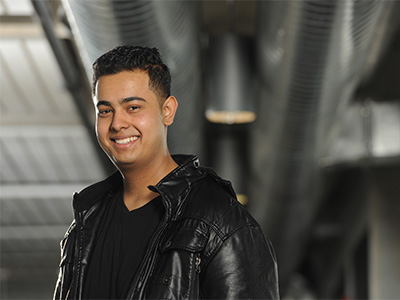 For Salman Sajid Malik, what Halifax and ĻŻĹī ”∆Ķ have in common is how friendly and welcoming the people are.
For Salman Sajid Malik, what Halifax and ĻŻĹī ”∆Ķ have in common is how friendly and welcoming the people are.
‚ÄúWithin a few weeks of my first semester, I fell in love with this city,‚ÄĚ says the fourth-year Computer Science student. ‚ÄúIt didn‚Äôt take any time to become part of the community.‚ÄĚ
Born in Pakistan and raised in Saudi Arabia after the age of four, Salman did pre-university studies in Malaysia for a year before coming to Dal with a renewable Schulich Scholarship. So he knows a thing or two about finding your feet in a new place, where it may not always be clear where to start making connections.
He met people like Suhaib Qaiser, a Computer Science PhD student and founder of the Pakistani Students Association (PSA), and Hasmeet Singh Chandok, a Computer Science master‚Äôs student and founder of the Sikh Students Association (SSA). ‚ÄúThey‚Äôve been a constant source of guidance and support for me,‚ÄĚ he says, ‚Äúand have become part of my family ‚ÄĒ the only family I have here in Halifax.‚ÄĚ
Through his work with those groups ‚ÄĒ¬†plus the Muslim Students Association, Indian Sub-Continent Students Society and ĻŻĹī ”∆Ķ International Students Association (DISA), among others ‚ÄĒ¬†Salman has helped enhance the cultural vibrancy of the university, providing support for other international students transitioning to life at ĻŻĹī ”∆Ķ and bringing together different groups to help the community.
‚ÄúI believe the first step towards making any big change or impact on a community level starts with building relations,‚ÄĚ he says. ‚ÄúAnd to strengthen the international student voice on campus, I believe it is important that the societies work together. Collectively, we can make a difference by simultaneously support a cause or raise funds for it to help those in need.‚ÄĚ
Salman helped plan the United for One fundraiser that raised over $160,000 for Syrian refugees, and worked on the Not 15 Million event that attracted over 400 people and raised over $26,000 for famine relief in Ethiopia. This year, his work with DISA resulted in the creation of four $1,000 scholarships and two $500 emergency bursaries for international students ‚ÄĒ¬†ones that not only support students in need, but recognize academic and extracurricular activities.
‚ÄúExtracurricular activities are often overlooked, but there is so much you get out of them,‚ÄĚ he says. ‚ÄúThey help you grow as a person, and for me personally, they have taught me how to improve myself as a leader.‚ÄĚ
While he’s now influencing others to volunteer and give their time to help others, who influenced Salman?
‚ÄúMy parents go out of their way to help people,‚ÄĚ he says. ‚ÄúMy father always says, ‚ÄėIt won‚Äôt cost me anything by dedicating some time to help someone, but it could possibly make the other person‚Äôs day, week, or even life easier in some way.‚Äô And the comedian Jim Carrey once said, ‚ÄėThe effect you have on others is the most valuable currency there is.‚Äô
‚ÄúI‚Äôve discovered that our contribution as individuals doesn‚Äôt have to be huge to make a difference.‚ÄĚ (Graeme Gunn)
Kym Sweeny (Law)
A single mom whose activism sparks change
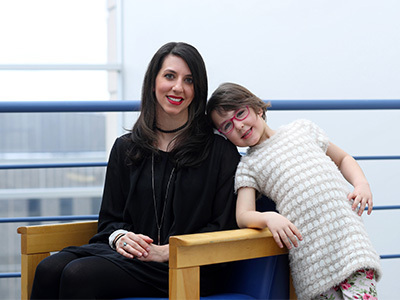 When third-year Law student Kym Sweeny takes to the stage to accept her Governors’ Award, she won’t be doing so alone. Like at last year’s IMPACT Awards, where she received the Student Activist of the Year Award, she’ll be joined by her son Elliott, age 6, a budding activist in their own right.
When third-year Law student Kym Sweeny takes to the stage to accept her Governors’ Award, she won’t be doing so alone. Like at last year’s IMPACT Awards, where she received the Student Activist of the Year Award, she’ll be joined by her son Elliott, age 6, a budding activist in their own right.
‚ÄúI was determined to not let having a child stop me from doing the work I wanted to do,‚ÄĚ says Kym, who is originally from near Yarmouth, N.S. (The two live in Halifax with their dogs, Huxley and Caya.) ‚ÄúElliott has always been coming to things like rallies or planning meetings for what I‚Äôm doing here on campus. They‚Äôve been growing up in and around it.‚ÄĚ
Kym says she learns from Elliott every day ‚ÄĒ¬†and no wonder, given that among her son‚Äôs activities is a recently launched series of ‚Äúpop-up‚ÄĚ schools for children and adults on topics like gender, racism and consent, for which they‚Äôve earned significant local media attention. But Elliott clearly takes a lot of inspiration from Kym, who in her three years at Dal has become a prominent actor for change on campus.
After two prior degrees focused on the intersection between environmental and Indigenous issues, and working closely in collaboration with Indigenous groups using decolonial frameworks, Kym saw a Law degree as a key tool to help her enact change on a broader, systemic level. At Dal, she’s conducted research with Dal faculty members like Naomi Metallic (Chancellor’s Chair in Aboriginal Law and Policy) and Fred Wein (School of Social Work), and worked with the Sipekne’katik First Nation on treaty issues.
But it‚Äôs her on-campus activism for which Kym has perhaps become best known. She‚Äôs been a leading campus voice on issues of sexual violence and consent, speaking regularly at events and playing a key role in developing the ĻŻĹī ”∆Ķ Student Union‚Äôs (DSU) sexual assault and harassment phone line in 2015.
That same year, she led the formation of the Student Advocacy Society at the Schulich School of Law, an independent group to help students from all programs navigate university complaint procedures for discrimination, harassment and assault. A year later, she wove the society’s work into the DSU’s main advocacy society as its director, working to transform it from a mostly academic advocacy office into one with a broader mandate.
‚ÄúWe‚Äôre helping the individual students, but we‚Äôre also trying to make ĻŻĹī ”∆Ķ a better place for everyone,‚ÄĚ she says.
As she looks ahead to articling at Halifax law firm Pink Larkin, where she hopes to continue her work with Indigenous communities, she‚Äôs proud of what she‚Äôs accomplished ‚ÄĒ especially as a single mother.
‚ÄúI find that they help me with my work, and give me that inspiration,‚ÄĚ she says of Elliott (who uses they/them pronouns). ‚ÄúSince having them, it‚Äôs given me more drive to create better communities for me and my son to grow up in, and show them that change is possible ‚ÄĒ¬†but that we have to work at it.‚ÄĚ (Ryan McNutt)

